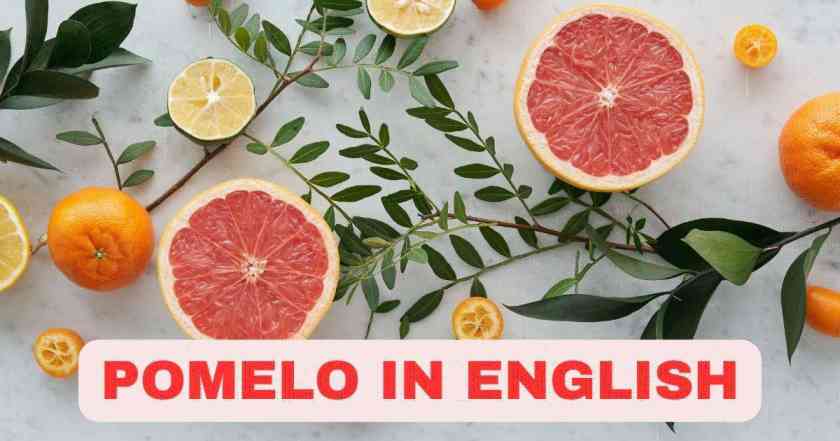Pomelo in English
- The name of Pomelo in English is “Shaddock” or “Jambola”.
BUY POMELO PLANT ONLINE
Pomelo Fruit
Pomelo is a large citrus fruit that originated in Southeast Asia. It is the largest citrus fruit in the world and has a unique flavor profile that sets it apart from other citrus fruits like oranges, lemons, and grapefruits. In this article, we will explore the various characteristics and health benefits of this unique fruit. Citrus maxima is the Binomial name of Pomelo.
The pomelo is typically larger than a grapefruit and can weigh up to several kilograms. It has a thick, pale yellow to greenish-yellow rind that is difficult to peel. The flesh of the fruit is pale pink to yellow and is divided into segments, much like other citrus fruits. The pulp of the pomelo is juicy and slightly acidic, with a sweet and tangy flavor that is less bitter than that of a grapefruit. Its distinctive taste is often described as a cross between a grapefruit and a sweet orange.
Pomelo is a nutrient-dense fruit that is rich in vitamins and minerals. It is an excellent source of vitamin C, which is essential for boosting the immune system and promoting skin health. Additionally, it contains high levels of potassium, which helps regulate blood pressure and supports heart health. Pomelo is also rich in antioxidants, which help protect the body against free radical damage and reduce the risk of chronic diseases like cancer and heart disease.
In traditional Chinese medicine, pomelo is believed to have a variety of health benefits. It is often used to treat coughs, colds, and other respiratory ailments. The fruit is also believed to have anti-inflammatory properties that can help reduce pain and swelling in the body. In Southeast Asia, pomelo is often used as a natural remedy for digestive issues like constipation and indigestion.
While Pomelo is a highly nutritious fruit, it is important to note that it may interact with certain medications. Pomelo contains compounds called furanocoumarins, which can interfere with the metabolism of certain drugs. If you are taking medication, it is important to consult with your doctor before consuming Pomelo or any other citrus fruit.
The cultivation of pomelo is primarily done in tropical and subtropical regions of Southeast Asia, where it thrives in warm and humid conditions. However, the fruit is also grown in other parts of the world, including Florida, California, and Israel.
Pomelo has a rich cultural significance in Southeast Asian countries like Thailand, where it is often used in religious ceremonies and festivals. In China, the fruit is associated with prosperity and good fortune and is often given as a gift during the Lunar New Year. The pomelo is also a symbol of luck and abundance in Vietnamese culture.
In addition to its cultural significance, pomelo has also become increasingly popular in the Western world in recent years. As more people become interested in exploring new and exotic fruits, pomelo has gained a reputation as a superfood that offers a range of health benefits. Its popularity has led to an increase in demand for the fruit, and it can now be found in many grocery stores and specialty markets.
History of Pomelo Fruit
The history of the pomelo fruit dates back centuries, to its origins in Southeast Asia. The fruit is believed to have originated in Malaysia and Indonesia, where it was first cultivated by local farmers. From there, it spread throughout the region, becoming a popular fruit in countries like Thailand, Vietnam, and China.
In China, the pomelo is believed to have been cultivated as early as 100 BC. The fruit was highly valued for its large size and sweet flavor, and it became a popular fruit among the wealthy and aristocratic classes. In Chinese culture, the pomelo is associated with prosperity and good fortune, and it is often given as a gift during the Lunar New Year.
In Thailand, the pomelo has a long history as a fruit of cultural and religious significance. The fruit is often used in Buddhist ceremonies and festivals, where it is offered as a symbol of purity and enlightenment. It is also a popular ingredient in Thai cuisine, where it is used in salads, desserts, and other dishes.
In Vietnam, the pomelo is known as “buoi,” and it is considered a symbol of luck and abundance. The fruit is often given as a gift during the Lunar New Year, and it is a popular ingredient in Vietnamese cuisine. In addition to its cultural significance, the pomelo has also been used in traditional Vietnamese medicine to treat a variety of ailments, including coughs, colds, and digestive issues.
The cultivation of pomelo eventually spread beyond Southeast Asia, with the fruit being introduced to other parts of the world, including Florida, California, and Israel. Today, the pomelo is grown in many tropical and subtropical regions around the world, and it has become increasingly popular as a superfood that offers a range of health benefits.
Pomelo Benefits
The Health Benefits of Pomelo are endless.
Here are some health benefits of Pomelos:
- High in vitamin C: Pomelos are a great source of vitamin C, which can help boost the immune system, promote skin health, and support collagen production.
- Rich in antioxidants: Pomelos contain various antioxidants, including flavonoids, which may help protect against cellular damage and reduce the risk of chronic diseases.
- Low in calories: Pomelos are relatively low in calories, making them a great option for those looking to lose weight or maintain a healthy diet.
- Improve digestion: The high fiber content in pomelos may help regulate digestion and prevent constipation.
- Reduce inflammation: Some studies suggest that the anti-inflammatory compounds in pomelos may help reduce inflammation in the body, which can contribute to various health conditions.
- Improve heart health: The potassium content in pomelos may help regulate blood pressure and reduce the risk of heart disease.
- Contains anticancer properties: Some preliminary research suggests that the bioactive compounds in pomelos may have anticancer properties and could help prevent the growth of cancer cells.








